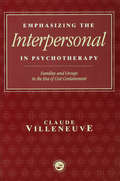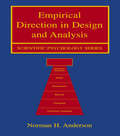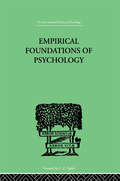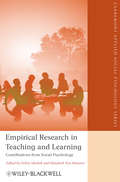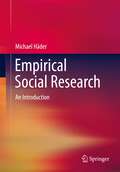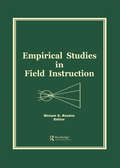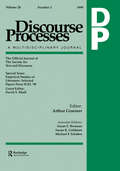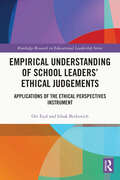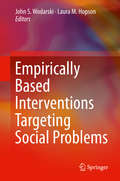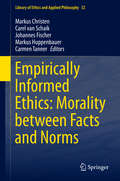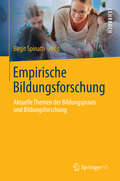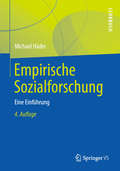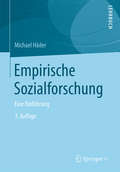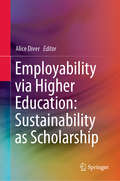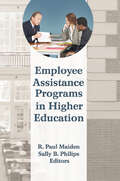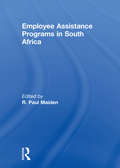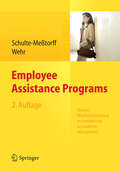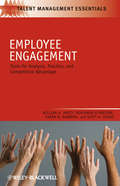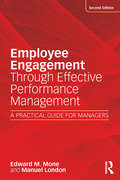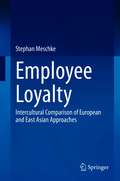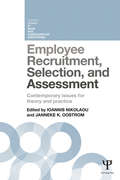- Table View
- List View
Emphasizing the Interpersonal in Psychotherapy: Families and Groups in the Era of Cost Containment
by Claude VilleneuveWith today's recent mental health care reforms many psychotherapists are being forced to reexamine the relevance of their practices. Economic pressures, managed care, and the discrepancy between what a therapist hopes to accomplish, and what the relative limitations of his or her treatments are, makes the future of psychotherapy uncertain. This provocative new book examines the failings of current individual psychotherapies and offers a model based on larger interpersonal schemes. This resource will be invaluable not only to therapists who are faced with the need to modify their practices, but also to any mental health practitioner who hopes to develop a more effective form of psychotherapy.
Empirical Direction in Design and Analysis (Scientific Psychology Series)
by Norman H. AndersonThe goal of Norman H. Anderson's new book is to help students develop skills of scientific inference. To accomplish this he organized the book around the "Experimental Pyramid"--six levels that represent a hierarchy of considerations in empirical investigation--conceptual framework, phenomena, behavior, measurement, design, and statistical inference. To facilitate conceptual and empirical understanding, Anderson de-emphasizes computational formulas and null hypothesis testing. Other features include: *emphasis on visual inspection as a basic skill in experimental analysis to help students develop an intuitive appreciation of data patterns; *exercises that emphasize development of conceptual and empirical application of methods of design and analysis and de-emphasize formulas and calculations; and *heavier emphasis on confidence intervals than significance tests. The book is intended for use in graduate-level experimental design/research methods or statistics courses in psychology, education, and other applied social sciences, as well as a professional resource for active researchers. The first 12 chapters present the core concepts graduate students must understand. The next nine chapters serve as a reference handbook by focusing on specialized topics with a minimum of technicalities.
Empirical Foundations Of Psychology (International Library Of Psychology Ser.)
by Pronko, N H & Bowles, J WFirst published in 1999. Routledge is an imprint of Taylor & Francis, an informa company.
Empirical Research in Teaching and Learning: Contributions from Social Psychology (Blackwell/Claremont Applied Social Psychology Series #4)
by Elizabeth Yost Hammer Debra MashekEmpirical Research in Teaching and Learning: Contributions from Social Psychology draws upon the latest empirical research and empirically-based theories from social psychology to inform the scholarship of teaching and learning. Provides an accessible theoretical grounding in social psychological principles and addresses specific empirical evidence drawn from teaching and learning contexts Features concrete strategies for use in the classroom setting Includes contributions from experts in both social psychology and the scholarship of teaching and learning
Empirical Social Research: An Introduction
by Michael HäderSocial science methods such as surveys, observations and content analyses are used in market research, studies of contemporary history, urban planning and communication research. They are all the more needed by sociologists and empirically working political scientists. Whether in the context of evaluating a prevention programme or for surveying health behaviour or for a study on social mobility, the confident handling of the social science instruments is always a prerequisite for obtaining reliable results. This book provides important information for users and developers of these instruments. It deals with the theoretical foundations of the methods, the steps in the conception and implementation of a project, the many variants of data collection, the methods to be used in the selection of study units, as well as the principles to be observed in the evaluation and documentation of the findings. With the help of numerous examples, a particularly clear presentation is achieved. In the fourth, updated edition, river sampling has now been included in the selection process, digital methods are increasingly presented and, against the background of the new data protection regulation, research ethics and data protection are also updated.
Empirical Studies in Field Instruction
by Miriam S RaskinThis landmark volume tackles the long overdue critical examination and evaluation of the state of the art of field instruction in social work education. For the first time, the findings of empirical research are consolidated to review, test, and question prevailing assumptions in social work field instruction. The vigorous assessment of the state of the art in field instruction, the field placement process, field instructors, and students enables the social work profession to reflect upon its accomplishments and review its practices. Provocative, informative, and controversial, Empirical Studies in Field Instruction also urges the profession to make changes and to insist on continued high caliber empirical research efforts in field instruction. It is an excellent resource for directors of field instruction, faculty field liaisons, field instructors, social work students, classroom instructors, researchers, and doctoral students.
Empirical Studies of Literature: Selected Papers From Igel '98. A Special Issue of discourse Processes (Advances In Discourse Processes Ser. #Vol. 17)
by Arthur GraesserThe sixth conference of the International Society for the Empirical Study of Literature, or IGEL, was held in August 1998 in Utrecht, Holland. The conference brought together a wide range of scholars concerned with understanding the place and role of literature in its social, historical, psychological, linguistic, and other dimensions, and who seek to advance our knowledge through empirical methods or more effective theoretical perspectives that may lead to empirical research. This special issue is based on papers from this conference, and represents just a small part of its rich variety.
Empirical Understanding of School Leaders’ Ethical Judgements: Applications of the Ethical Perspectives Instrument (Routledge Research in Educational Leadership)
by Izhak Berkovich Ori EyalThis volume offers a holistic, empirically grounded examination of the factors which influence educational leaders’ ethical judgments in their day-to-day work in schools. Drawing on a range of quantitative studies, the text utilizes organizational psychology to explore multiple ethical paradigms. It considers social aspects including ethnicity, gender, hegemony-minority relations, and leadership styles which influence and drive ethical judgment patterns employed by educators and principals. The book ultimately demonstrates the Ethical Perspectives Instrument (EPI) as an effective tool for the assessment of various ethical viewpoints and their interactions, suitable for application to diverse cultures and socio-educational circumstances. An important study of the leaders’ ethics and preparation in handling marginalized populations, this book will be valuable for academics, researchers, and graduate students working in the fields of educational leadership, organizational psychology, and the sociology of education.
Empirically Based Interventions Targeting Social Problems
by John S. Wodarski Laura M. HopsonThis unique volume demonstrates the effectiveness of applying an evidence-based practice process to the solution of selected social problems. It focuses on social work interventions addressing family, community, and societal factors. Research indicates that reinforcement for positive behavior at the group, organizational, and community levels, as opposed to interventions focusing on the individual, are more likely to result in meaningful improvement in well-being. Chapters address issues such as child maltreatment, educationally disadvantaged children, violence in schools, adolescent sexuality, substance abuse, crime, urban decline and homelessness, unemployment, marital conflict, and chronic medical problems.Empirically Based Interventions Targeting Social Problems is a relevant resource for practitioners and counseling professionals whose work involves interventions with children and families as well as communities. It also is a useful text for graduate students in social work as well as students preparing for other helping professions including psychology, sociology, marital and family counseling, and child development.
Empirically Informed Ethics: Morality between Facts and Norms
by Markus Christen Carel Van Schaik Johannes Fischer Markus Huppenbauer Carmen TannerThis volume provides an overview of the most recent developments in empirical investigations of morality and assesses their impact and importance for ethical thinking. It involves contributions of scholars both from philosophy, theology and empirical sciences with firm standings in their own disciplines, but an inclination to step across borders--in particular the one between the world of facts and the world of norms. Human morality is complex, and probably even messy--and this clean distinction becomes blurred whenever one looks more closely at the various components that enable and influence our moral actions and ethical orientations. In that way, morality may indeed be located between facts and norms--and an empirically informed ethics that is less concerned with analytical purity but immerses into this moral complexity may be an important step to make the contributions of ethics to this world more valuable and relevant.
Empirische Bildungsforschung
by Birgit SpinathSind Jungen die neuen Bildungsverlierer? Werden die Deutschen immer dümmer? Hat PISA die Schulen besser gemacht?Entscheiden sich die Richtigen für ein Lehramtsstudium? Diese und weitere Themen sind gesellschaftlich hoch relevant. Täglich berichten Medien über Bildung - mal mehr, mal weniger fundiert. Oft wird dabei ein überpointiertes, verzerrtes Bild gezeichnet, so dass es schwer ist, sich eine eigene Meinung zu bilden. Das vorliegende Buch greift aktuelle Themen aus Bildungsforschung und Bildungspraxis auf und stellt in kurzer, übersichtlicher Form den Forschungsstand dar. Sie lernen nicht nur die Fakten, sondern auch die Personen kennen, die sich diesen Fragen in Forschung und Praxis widmen. Zu diesem Zweck wurden Interviews mit Expertinnen und Experten geführt, die in diesem Buch nachzulesen sind, aber auch als Videos angeschaut werden können. Zu Wort kommen führende Bildungsforscherinnen und -forscher aus Psychologie, Erziehungswissenschaft, Soziologie und Bildungsökonomie. Zielgruppe Das Buch kann von allen mit Gewinn gelesen werden, die sich für Bildung interessieren. Studierende verschiedener Fachrichtungen, Referendarinnen und Referendare sowie Lehrerinnen und Lehrer finden in diesem Buch viele Themen, die ihre Arbeit direkt betreffen. Die Lektüre kann auch Grundlage für eine Seminargestaltung in Fächern sein, die sich mit Bildungsforschung beschäftigen (Psychologie, Erziehungswissenschaft, Soziologie, Bildungsökonomie, Empirische Bildungsforschung etc. ). Durch den Interview-Stil ist das Buch angenehm zu lesen und daher auch als Freizeitlektüre geeignet.
Empirische Bildungsforschung: Aktuelle Themen der Bildungspraxis und Bildungsforschung (Meet the Expert: Wissen aus erster Hand)
by Birgit SpinathSind Jungen die neuen Bildungsverlierer? Werden die Deutschen immer dümmer? Hat PISA die Schulen besser gemacht?Entscheiden sich die Richtigen für ein Lehramtsstudium?Diese und weitere Themen sind gesellschaftlich hoch relevant. Täglich berichten Medien über Bildung - mal mehr, mal weniger fundiert. Oft wird dabei ein überpointiertes, verzerrtes Bild gezeichnet, so dass es schwer ist, sich eine eigene Meinung zu bilden. Das vorliegende Buch greift aktuelle Themen aus Bildungsforschung und Bildungspraxis auf und stellt in kurzer, übersichtlicher Form den Forschungsstand dar. Sie lernen nicht nur die Fakten, sondern auch die Personen kennen, die sich diesen Fragen in Forschung und Praxis widmen. Zu diesem Zweck wurden Interviews mit Expertinnen und Experten geführt, die in diesem Buch nachzulesen sind, aber auch als Videos angeschaut werden können. Zu Wort kommen führende Bildungsforscherinnen und –forscher aus Psychologie, Erziehungswissenschaft, Soziologie und Bildungsökonomie.ZielgruppeDas Buch kann von allen mit Gewinn gelesen werden, die sich für Bildung interessieren. Studierende verschiedener Fachrichtungen, Referendarinnen und Referendare sowie Lehrerinnen und Lehrer finden in diesem Buch viele Themen, die ihre Arbeit direkt betreffen. Die Lektüre kann auch Grundlage für eine Seminargestaltung in Fächern sein, die sich mit Bildungsforschung beschäftigen (Psychologie, Erziehungswissenschaft, Soziologie, Bildungsökonomie, Empirische Bildungsforschung etc.). Durch den Interview-Stil ist das Buch angenehm zu lesen und daher auch als Freizeitlektüre geeignet.
Empirische Bildungsforschung: Aktuelle Themen der Bildungspraxis und Bildungsforschung (Meet the Expert: Wissen aus erster Hand)
by Birgit SpinathSind Jungen die neuen Bildungsverlierer? Werden die Deutschen immer dümmer? Hat PISA die Schulen besser gemacht?Entscheiden sich die Richtigen für ein Lehramtsstudium?Diese und weitere Themen sind gesellschaftlich hoch relevant. Täglich berichten Medien über Bildung - mal mehr, mal weniger fundiert. Oft wird dabei ein überpointiertes, verzerrtes Bild gezeichnet, so dass es schwer ist, sich eine eigene Meinung zu bilden. Das vorliegende Buch greift aktuelle Themen aus Bildungsforschung und Bildungspraxis auf und stellt in kurzer, übersichtlicher Form den Forschungsstand dar. Sie lernen nicht nur die Fakten, sondern auch die Personen kennen, die sich diesen Fragen in Forschung und Praxis widmen. Zu diesem Zweck wurden Interviews mit Expertinnen und Experten geführt, die in diesem Buch nachzulesen sind, aber auch als Videos angeschaut werden können. Zu Wort kommen führende Bildungsforscherinnen und –forscher aus Psychologie, Erziehungswissenschaft, Soziologie und Bildungsökonomie.ZielgruppeDas Buch kann von allen mit Gewinn gelesen werden, die sich für Bildung interessieren. Studierende verschiedener Fachrichtungen, Referendarinnen und Referendare sowie Lehrerinnen und Lehrer finden in diesem Buch viele Themen, die ihre Arbeit direkt betreffen. Die Lektüre kann auch Grundlage für eine Seminargestaltung in Fächern sein, die sich mit Bildungsforschung beschäftigen (Psychologie, Erziehungswissenschaft, Soziologie, Bildungsökonomie, Empirische Bildungsforschung etc.). Durch den Interview-Stil ist das Buch angenehm zu lesen und daher auch als Freizeitlektüre geeignet.
Empirische Bildungsforschung: Eine elementare Einführung
by Heinz Reinders Dagmar Bergs-Winkels Annette Prochnow Isabell PostDas Lehrbuch ist eine umfangreiche und gleichzeitig elementare Einführung, in der die Empirische Bildungsforschung in ihren Forschungsmethoden, theoretischen Zugängen und Untersuchungsfeldern aufbereitet wird. In kompakten und gut lesbaren Beiträgen von ausgewiesenen Fachexpertinnen und -experten wird in grundlegende Aspekte der Empirischen Bildungsforschung eingeführt. Ziel ist es, Studierenden einen Überblick über die ausgewählten Themen zu geben. Die Themenauswahl orientiert sich an gängigen Modulbeschreibungen grundständiger Studiengänge. Studierende in Lehramtsstudiengängen und angrenzenden bildungswissenschaftlichen Bereichen erhalten gesichertes Grundlagenwissen zu allen relevanten Themen in einem Band.
Empirische Sozialforschung: Eine Einführung
by Michael HäderSozialwissenschaftliche Methoden wie Befragungen, Beobachtungen und Inhaltsanalysen kommen in der Marktforschung, bei Studien zur Zeitgeschichte, in der Stadtplanung und in der Kommunikationsforschung zum Einsatz. Erst recht werden sie von Soziologen und empirisch arbeitenden Politikwissenschaftlern benötigt. Egal, ob im Rahmen der Evaluation eines Präventionsprogramms oder für die Erhebung des Gesundheitsverhaltens oder für eine Studie zur sozialen Mobilität, die sichere Handhabung des sozialwissenschaftlichen Instrumentariums ist stets die Voraussetzung, um belastbare Ergebnisse zu erzielen. Das Buch stellt wichtige Informationen für die Anwender und Entwickler dieser Instrumente zur Verfügung. Es behandelt die theoretischen Grundlagen der Methoden, die Schritte bei der Konzipierung und Umsetzung eines Projekts, die vielfältigen Varianten der Datenerhebung, die bei der Auswahl der Untersuchungseinheiten einzusetzenden Methoden ebenso wie die Prinzipien, die bei der Auswertung und Dokumentation der Befunde zu beachten sind. Mithilfe zahlreicher Beispiele gelingt eine besonders anschauliche Darstellung.In der vierten, aktualisierten Auflage hat im Rahmen der Auswahlverfahren nun auch das River Sampling Eingang gefunden, werden verstärkt auch digitale Methoden vorgestellt sowie vor dem Hintergrund der neuen Datenschutzverordnung auch die Forschungsethik und der Datenschutz aktualisiert.
Empirische Sozialforschung: Eine Einführung
by Michael HäderSozialwissenschaftliche Methoden wie Befragungen, Beobachtungen und Inhaltsanalysen kommen in der Marktforschung, bei Studien zur Zeitgeschichte, in der Stadtplanung und in der Kommunikationsforschung zum Einsatz. Erst recht werden sie von Soziologen und empirisch arbeitenden Politikwissenschaftlern benötigt. Egal, ob im Rahmen der Evaluation eines Präventionsprogramms oder für die Erhebung des Gesundheitsverhaltens oder für eine Studie zur sozialen Mobilität, die sichere Handhabung des sozialwissenschaftlichen Instrumentariums ist stets die Voraussetzung, um belastbare Ergebnisse zu erzielen. Das Buch stellt wichtige Informationen für die Anwender und Entwickler dieser Instrumente zur Verfügung. Es behandelt die theoretischen Grundlagen der Methoden, die Schritte bei der Konzipierung und Umsetzung eines Projekts, die vielfältigen Varianten der Datenerhebung, die bei der Auswahl der Untersuchungseinheiten einzusetzenden Methoden ebenso wie die Prinzipien, die bei der Auswertung und Dokumentation der Befunde zu beachten sind. Mithilfe zahlreicher Beispiele gelingt eine besonders anschauliche Darstellung.
Employability via Higher Education: Sustainability as Scholarship
by Alice DiverThis book discusses the topic of graduate employability from the premise that in this era of ‘massification,’ economic austerity, and political uncertainties, higher education (HE) no longer guarantees a clear ‘work place advantage.’ Divided into three sections, the book offers theoretical and philosophical discourses on the ‘HE quandary,’ whilst taking into account – and critiquing - political, temporal, and national contexts. It culminates in an investigation into specific discipline areas. It offers insights into the way that institutions, decision-makers, academics, and professional support staff can work together towards ensuring that our graduates are able to cope with the varied demands and challenges of modern job markets. It harnesses arguments and reflections on the breadth and depth of the functions of HE, such as social transformation, promoting principles of social justice, and providing opportunities. It grounds these in a triadic model for enhancing student engagement and holistic learning, namely, the emotional, cognitive, and behavioural aspects. As an anthology, it is forward-gazing in terms of the sustainability debate, whilst still offering evidence-based, research-grounded, practical suggestions to readers looking for tips and tools of the trade.
Employee Assistance Programs in Higher Education
by R. Paul Maiden; Sally B. PhilipsUnderstand the challenges faced by university based EAPs and the strategies to effectively meet needs-and discover what works and what does not Academia is a diverse workplace unlike any other, and subsequently, employee assistance program (EAP) issues are unique. Employee Assistance Programs in Higher Education focuses on the unique challenges of employee assistance service delivery in a university setting. This handy resource discusses the evolution, development, and strategies in managing an EAP in academia while comparing the substantial differences in program application between academic settings and corporate settings. Discussions include outsourcing, support groups, implementation of services, and effective model frameworks. Employee Assistance Programs in Higher Education explores in depth how the difference of being an academic institution influences the administration of an EAP. Reducing costs, assessing the value of an EAP, faculty resistance to accessing EAPs, organizational and interpersonal problems, manager support groups to reduce stress, developing &’soft skills&’, and addressing the deaths of faculty, staff, and students are examined in detail. This unique resource is extensively referenced and includes tables to clearly present data. Topics in Employee Assistance Programs in Higher Education include: the evolution of the IAEAPE university EAP response to traumas on campus enhancing faculty access university EAPs and outsourcing creating a specialized EAP program comparison between academic and corporate cultures case study of the University of Saskatchewan EAP and more! Employee Assistance Programs in Higher Education is a comprehensive resource for academic administrators; benefit plan managers; university based EAP managers and directors; EAP, work/life, and wellness professionals; members of International Association of Employee Assistance Professionals in Education; Employee Assistance Professionals Association; Employee Assistance Society of North America; Association of Work Life Professionals; Society for Human Resource Management Schools of Social Work; educators in schools of social work, psychology, counseling education, and business.
Employee Assistance Programs in South Africa
by R Paul MaidenEmployee Assistance Programs (EAPs) are a relatively new development in South Africa, having emerged in the 1980s, and this groundbreaking book provides a comprehensive overview of these EAPs in South Africa. It gives readers a first-hand view of the myriad issues encountered by South African practitioners. Employee Assistance Programs in South Africa provides EAP professionals, human resources managers, social workers, psychologists, and other mental health professionals with startling insight into the significant clinical, cultural, and ethical problems that their South African colleagues face in the workplace. It begins to fill the gap in the literature on professional practice in an apartheid society and can help develop opportunities for dialogue and an exchange of ideas between all EAP workers to help educate them and bring them together. This enlightening and potentially controversial book addresses a variety of pertinent topics, including: the conceptual sophistication of EAPs currently operating in the South African business community an evaluation of the macro model EAP in South Africa in light of the country’s sociopolitical, economic, and social problems cultural concerns facing black and white EAP practitioners and clients ethical conflicts inherent in working in an environment sanctioned by apartheid widespread alcohol and drug problems in South Africa the development of a post-traumatic stress and accident involvement program current educational developments in the EAP field in South AfricaProviding a thorough, clear understanding of South Africa’s EAPs, this is an ideal book for all professionals and advanced students interested in the effects of political, societal, and cultural values on the operations of EAPs in a foreign country.
Employee Assistance Programs: Externe Mitarbeiterberatung im betrieblichen Gesundheitsmanagement
by Claudia Schulte-Meßtorff Peter WehrPsychische Probleme sind heute der Grund Nr. 1 für weiter steigende Krankenstände und Arbeitsausfälle quer durch alle Branchen, und die Arbeitsbedingungen in unseren Betrieben sind in der gesellschaftlichen Diskussion als Ursache für diese Entwicklung weiter im Fokus. Mit einer Verschärfung der Situation in den letzten Jahren sind auch das Problembewusstsein bei Personalverantwortlichen sowie die Anzahl der Betriebe, die sich für die Gesundheit ihrer Mitarbeiter engagieren, weiter gestiegen. Eine konkrete Methode zur Erhaltung der Mitarbeitergesundheit, die "externe Mitarbeiterberatung" - im englischen Sprachraum seit vielen Jahren als "Employee Assistance Programs" bekannt -, rückt dabei mehr und mehr in den Fokus. Darunter versteht man einen Service, den Unternehmen ihren Mitarbeitern zur Verfügung stellen, um diese in diversen - beruflichen wie privaten - Belangen durch einen externen Berater zu unterstützen. Dieses Buch stellt neben Grundlagen zu psychischen Störungen, aktuellen Statistiken etc. die "neue" Methode kompakt und praxisnah vor, beschreibt ihre Implementierung ins betriebliche Gesundheitsmanagement, betriebliche Voraussetzungen und ihren Nutzen und Qualitätsanforderungen. Abschließend wird ein Business-Case für den Einsatz eines EAP-Programms im Unternehmen dargestellt sowie die Praxis der Mitarbeiterberatung am Beispiel einer Beratung per Telefon. - Für Gesundheitsverantwortliche in Unternehmen, Personalleiter und Geschäftsführer.
Employee Engagement
by William H. Macey Benjamin Schneider Karen M. Barbera Scott A. YoungProviding both practical advice, tools, and case examples, Employee Engagement translates best practices, ideas, and concepts into concrete and practical steps that will change the level of engagement in any organization. Explores the meaning of engagement and how engagement differs significantly from other important yet related concepts like satisfaction and commitmentDiscusses what it means to create a culture of engagementProvides a practical presentation deck and talking points managers can use to introduce the concept of engagement in their organizationAddresses issues of work-life balance, and non-work activities and their relationship to engagement at work
Employee Engagement Through Effective Performance Management: A Practical Guide for Managers
by Manuel London Edward M Mone Edward M. MoneThis book is a practical guide for managers to increase and support employee engagement through stronger performance management tools and techniques. In this second edition, Edward Mone and Manuel London incorporate new developments in the field, including discussion of issues about the value of challenging goals, annual formal appraisals, forced ranking, and ways to give constructive feedback. The authors expand the traditional notion of performance management to include building trust, creating conditions of empowerment, managing team learning, and maintaining ongoing straightforward communications about performance, all of which are critical to employee engagement. Case studies offer concrete examples, and checklists and surveys supply managers with ways to assess employee engagement as well as directions for increasing engagement. An up-to-date, straightforward guide, this book is appropriate for graduate students in Employee Engagement, Human Resources, and Management Studies, as well as scholars and practitioners in those fields.
Employee Loyalty: Intercultural Comparison of European and East Asian Approaches
by Stephan MeschkeThis book aims to provide a deeper understanding of the concept and negative outcomes of employee loyalty, considering employees in organizations and OB theory, and comparing employee experiences across both European and East Asian cultures. Through an international analysis of employee loyalty within the service industry, the author highlights the importance of this highly relevant but often overlooked topic to addressing practical issues such as conflict solution, employee retention, service mentality, and work effort. Building on a clear definition and evaluation of the concept of employee loyalty, this book explores meaningful theoretical and practical implications of employee views of the organization, working group, and supervisor.
Employee Proactivity in Organizations: An Attachment Perspective
by Chia-Huei WuWhat makes some people more likely to initiate positive change within their organizations? Can this behaviour be influenced by management? Employee proactivity has largely been understood in terms of employees changing their environment or changing themselves. In this novel study Wu offers an alternative lens through which to examine such behaviour – the concept of attachment theory. Wu integrates the current understanding of motivational factors in shaping proactive workers, through his introduction to attachment theory, and development of it as a theoretical framework. This compelling approach provides academics with a new way of thinking about employee behaviour while also acting as a guide for practitioners and managers.
Employee Recruitment, Selection, and Assessment: Contemporary Issues for Theory and Practice
by Ioannis Nikolaou Janneke K. OostromPersonnel selection is changing. Whilst traditional face-to-face interviews are still common, the range of assessment processes that inform the selection of candidates is increasingly diverse, taking advantage not only of new technologies, but also using new methods and strategies, such as assessment centres and personality testing. This new collection looks at the most important contemporary issues in recruitment, selection and assessment today, highlighting the latest research from the perspective of both recruiter and applicant. The book is written by an international range of prominent scholars in this area, and provides up-to-date analysis of key topic areas, including: How measurements of intelligence can impact on recruitment policies The use and value of personality tests An analysis of social interaction in the interview process The value and impact of video resumes in recruitment How social networks affect how applicants are perceived Job analysis and competencies modelling Part of the Current Issues in Work & Organizational Psychology series, this is an important book that shines a light on the latest theory and practice in employee recruitment. It will interest not only students and researchers of Organizational Psychology, HRM and Business and Management, but will also engage professionals in the field.
